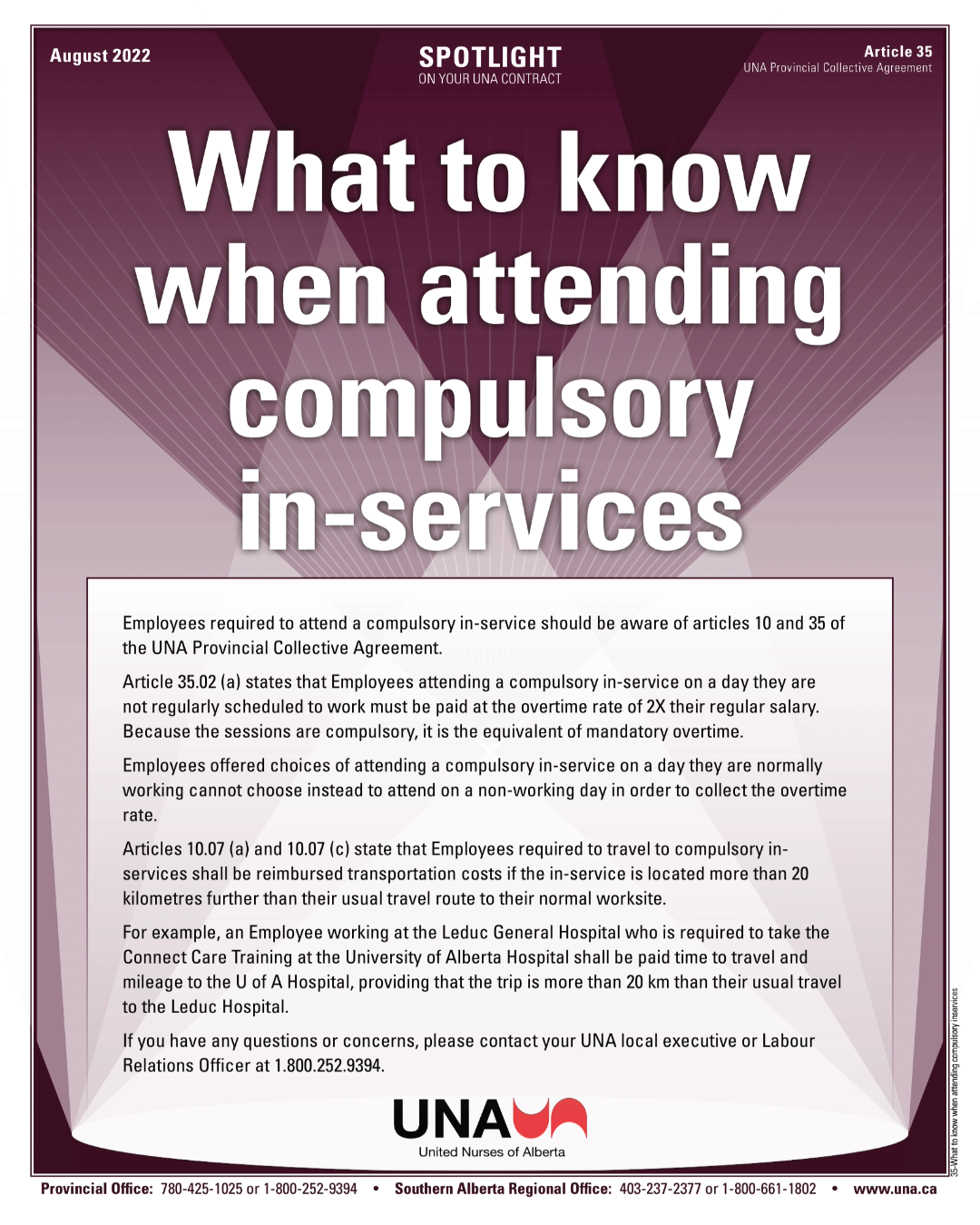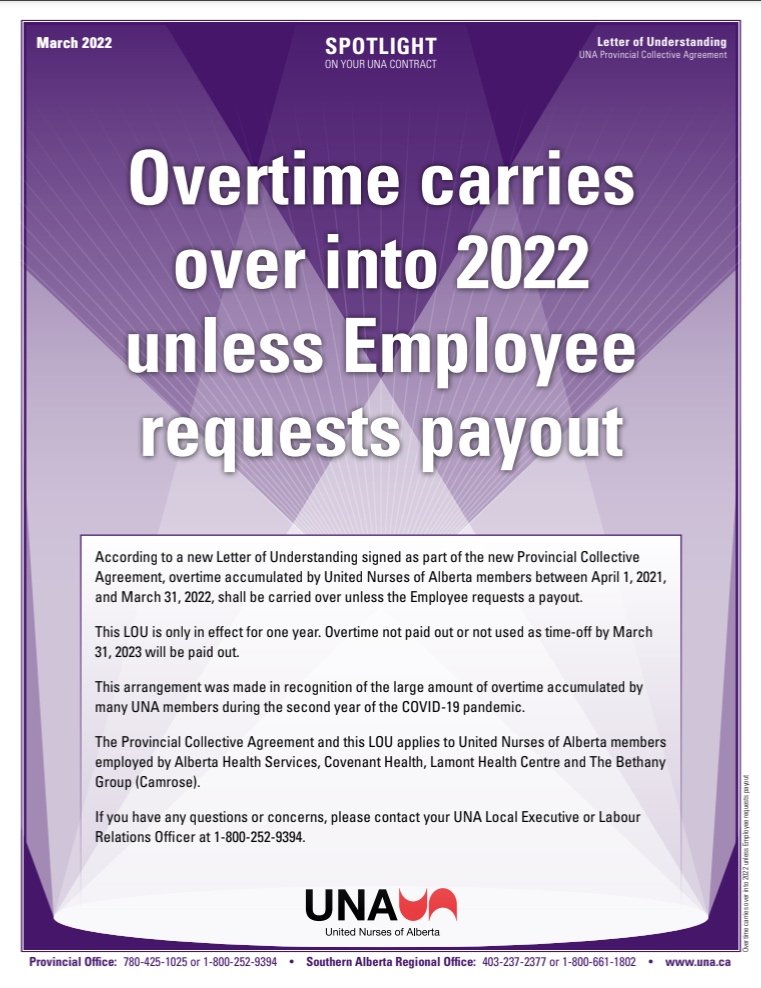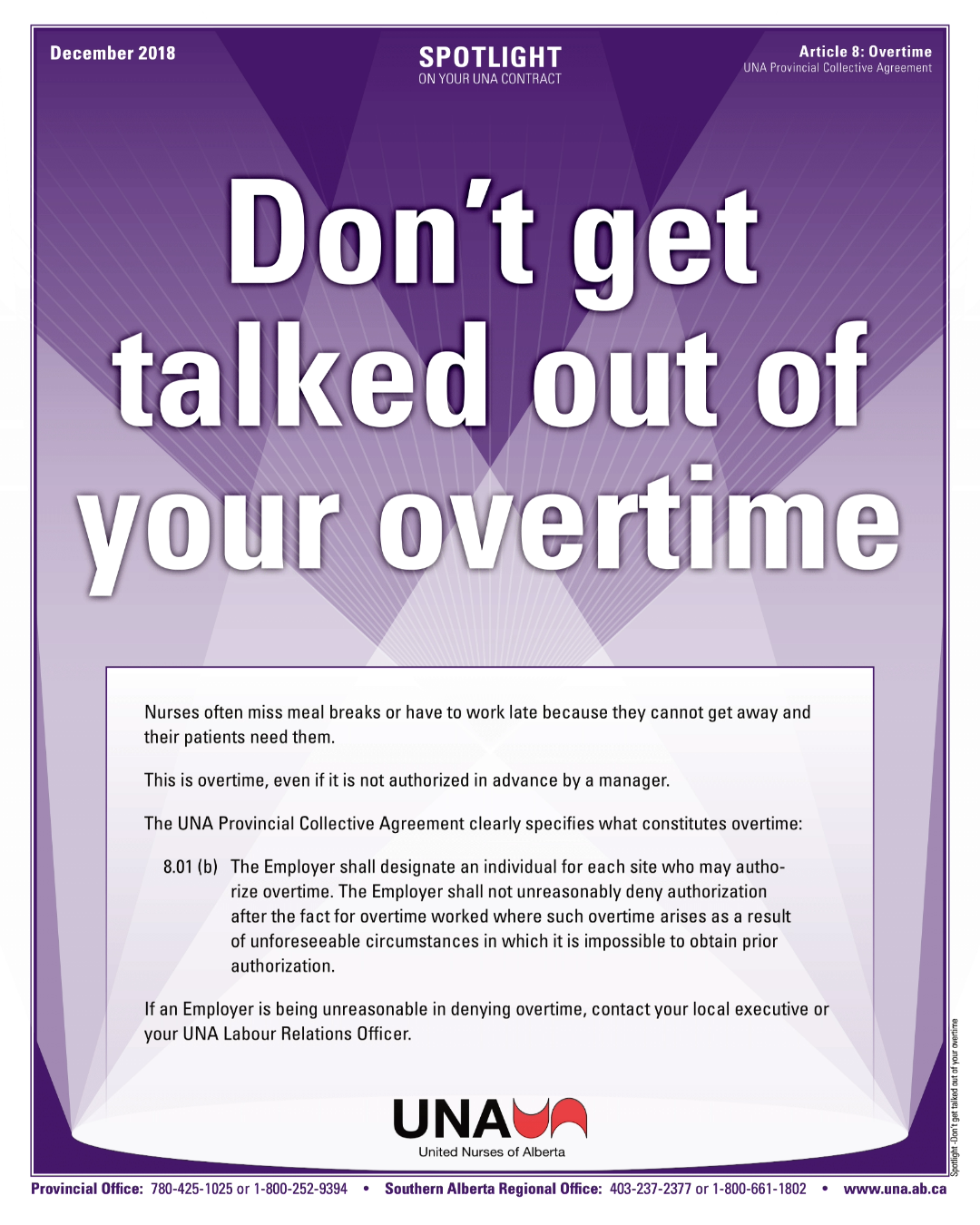The UNA Resources, Local Updates and Newsletter Blog
Stop trying to find information all over the web. Start below with a simple access to read the blog’s United Nurse of Alberta (UNA) resources, UNA Local 115 updates and our newsletter so you can be informed!

What to know when attending compulsory inservices
What to know when attending compulsory inservices
Employees required to attend a compulsory in-service should be aware of articles 10 and 35 of the UNA Provincial Collective Agreement. Article 35.02 (a) states that Employees attending a compulsory in-service on a day they are not regularly scheduled to work must be paid at the overtime rate of 2X their regular salary. Because the sessions are compulsory, it is the equivalent of mandatory overtime. Employees offered choices of attending a compulsory in-service on a day they are normally working cannot choose instead to attend on a non-working day in order to collect the overtime rate. Articles 10.07 (a) and 10.07 (c) state that Employees required to travel to compulsory inservices shall be reimbursed transportation costs if the in-service is located more than 20 kilometres further than their usual travel route to their normal worksite. For example, an Employee working at the Leduc General Hospital who is required to take the Connect Care Training at the University of Alberta Hospital shall be paid time to travel and mileage to the U of A Hospital, providing that the trip is more than 20 km than their usual travel to the Leduc Hospital. If you have any questions or concerns, please contact your UNA local executive or Labour Relations Officer at 1.800.252.9394.

Overtime carries over into 2022 unless Employee requests payout
Overtime carries over into 2022 unless Employee requests payout
According to a new Letter of Understanding signed as part of the new Provincial Collective Agreement, overtime accumulated by United Nurses of Alberta members between April 1, 2021, and March 31, 2022, shall be carried over unless the Employee requests a payout. This LOU is only in effect for one year. Overtime not paid out or not used as time-off by March 31, 2023 will be paid out. This arrangement was made in recognition of the large amount of overtime accumulated by many UNA members during the second year of the COVID-19 pandemic. The Provincial Collective Agreement and this LOU applies to United Nurses of Alberta members employed by Alberta Health Services, Covenant Health, Lamont Health Centre and The Bethany Group (Camrose). If you have any questions or concerns, please contact your UNA Local Executive or Labour Relations Officer at 1-800-252-9394.

Employees have a right to refuse overtime – except in emergencies
Employees have a right to refuse overtime – except in emergencies
Under Article 8.04 of the UNA Provincial General Agreement, Employees have a right to refuse overtime – but not in an emergency, when the Employer can assign mandatory overtime. Members who are concerned that the Employer is using mandatory overtime improperly, or that they are being asked to work too much overtime, need to inform UNA as soon as possible so that an appropriate response can be made. Article 8:04 states: (a) The Employer shall endeavour to minimize the use of mandatory overtime. (b) The Employer may request an Employee to work a reasonable amount of overtime. Should the Employee believe that the Employer is requesting the Employee to work more than a reasonable amount of overtime, then the Employee may decline to work the additional overtime, except in an emergency, without being subject to disciplinary action. (c) An emergency is a circumstance that calls for immediate action. (d) The Employer shall take reasonable steps to avoid a staffing situation which may become an emergency prior to requiring overtime. Since “reasonable” is not defined in this article, it is up to Employees to use their own judgment determine if the Employer’s request in unreasonable. If you believe you are being asked to work an unreasonable amount of overtime, you should contact your Local executive or UNA Labour Relations Officer immediately. Can the employer ask you to work anyway? Yes, the Employer may use mandatory overtime in the event of an emergency. If you believe you have been asked to work mandatory overtime for something that is not a true emergency, or that the Employer has not taken reasonable steps to avoid a staffing situation that has resulted in an emergency, you should also contact your Local executive or UNA Labour Relations Officer immediately. You can contact your UNA Local Executive or Labour Relations Officer at 1-800-252-9394.

Casual Employees eligible for overtime when they work beyond their scheduled shift hours
Casual Employees eligible for overtime when they work beyond their scheduled shift hours
When Casual Employees are offered a shift, they should confirm the length of the shift they are being asked to work. This is important information as Casual Employees are eligible for overtime if they work beyond their scheduled shifts hours. However, Casual Employees must work a minimum of 7.75 hours to be eligible for overtime. If a Casual if replacing a regular Employee, any hours they work beyond what the regular Employee would have worked (7.75 hrs or an extended hour shift) is deemed to be overtime and paid at 2X the basic rate of pay. When a Casual is offered a shift that does not replace a regular Employee, they should confirm the number of hours they are booked to work. Any hours worked beyond the scheduled shift length and in excess of 7.75 hours should be paid at 2X the basic rate of pay. If a Casual Employee is scheduled to work a 4 hour shift and is asked to stay an addition 3.75 hours (total of 7.75 hours), they are not eligible for overtime. Make sure you claim overtime when it is appropriate. If your Employer denies your request for overtime, contact your Local Executive or Labour Relation Officer as soon as possible.

Casual Employees eligible for overtime when they work in excess 147.25 hours in a four week period
Casual Employees eligible for overtime when they work in excess 147.25 hours in a four-week period

Overtime for compulsory in-services on designated days of rest
Overtime for compulsory in-services on designated days of rest
Employees who are required to attend a compulsory in-service session on any day they are not regularly scheduled to work must be paid at the overtime rate of 2X their regular salary. Under Article 35.02 (a) of the UNA Provincial Collective Agreement, Employees can be required to attend compulsory in-services on days they are not normally working. Because the sessions are compulsory, it is the equivalent of mandatory overtime, and must be paid at the overtime rate. UNA has won two arbitrations on this topic. Employees who are offered choices of attending a compulsory in-service on a day they are normally working cannot choose instead to attend on a non-working day, in order to get the overtime rate. In the case of any dispute about the correct rate to be paid for attending a compulsory inservice, check immediately with your UNA local executive or Labour Relations Officer.

Don’t get talked out of your overtime
Don’t get talked out of your overtime
Nurses often miss meal breaks or have to work late because they cannot get away and their patients need them. This is overtime, even if it is not authorized in advance by a manager. The UNA Provincial Collective Agreement clearly specifies what constitutes overtime: 8.01 (b) The Employer shall designate an individual for each site who may authorize overtime. The Employer shall not unreasonably deny authorization after the fact for overtime worked where such overtime arises as a result of unforeseeable circumstances in which it is impossible to obtain prior authorization. If an Employer is being unreasonable in denying overtime, contact your local executive or your UNA Labour Relations Officer.
